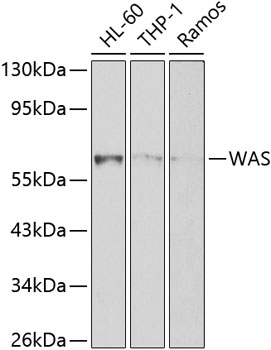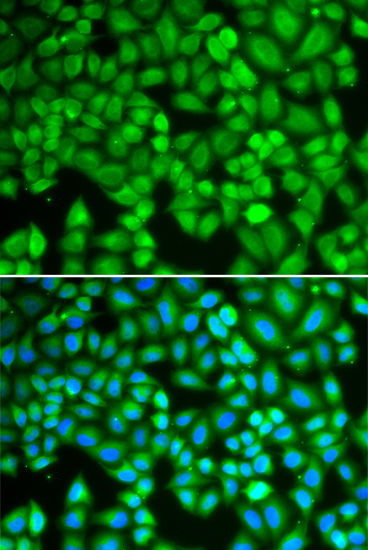-
Product Name
WAS Polyclonal Antibody
- Documents
-
Description
Polyclonal antibody to WAS
-
Tested applications
WB, IF
-
Species reactivity
Human
-
Alternative names
WAS antibody; IMD2 antibody; SCNX antibody; THC antibody; THC1 antibody; WASP antibody; WASPA antibody; Wiskott-Aldrich syndrome antibody
-
Isotype
Rabbit IgG
-
Preparation
Antigen: Recombinant fusion protein containing a sequence corresponding to amino acids 60-250 of human WAS (NP_000368.1).
-
Clonality
Polyclonal
-
Formulation
PBS with 0.02% sodium azide, 50% glycerol, pH7.3.
-
Storage instructions
Store at -20℃. Avoid freeze / thaw cycles.
-
Applications
WB 1:500 - 1:2000
IF 1:10 - 1:100 -
Validations

Western blot - WAS Polyclonal Antibody
Western blot analysis of extracts of various cell lines, using WAS Antibody at 1:1000 dilution.Secondary antibody: HRP Goat Anti-Rabbit IgG (H+L) at 1:10000 dilution.Lysates/proteins: 25ug per lane.Blocking buffer: 3% nonfat dry milk in TBST.Detection: ECL Basic Kit .

Immunofluorescence - WAS Polyclonal Antibody
Immunofluorescence analysis of U2OS cells using WAS antibody . Blue: DAPI for nuclear staining.
-
Background
Effector protein for Rho-type GTPases that regulates actin filament reorganization via its interaction with the Arp2/3 complex. Important for efficient actin polymerization. Possible regulator of lymphocyte and platelet function. Mediates actin filament reorganization and the formation of actin pedestals upon infection by pathogenic bacteria. In addition to its role in the cytoplasmic cytoskeleton, also promotes actin polymerization in the nucleus, thereby regulating gene transcription and repair of damaged DNA. Promotes homologous recombination (HR) repair in response to DNA damage by promoting nuclear actin polymerization, leading to drive motility of double-strand breaks (DSBs).
Related Products / Services
Please note: All products are "FOR RESEARCH USE ONLY AND ARE NOT INTENDED FOR DIAGNOSTIC OR THERAPEUTIC USE"
